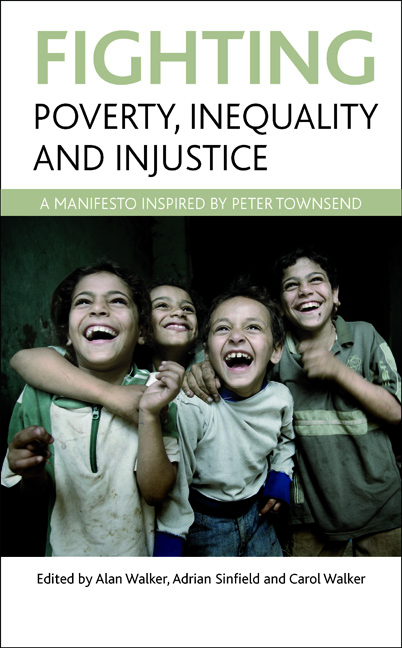Book contents
- Frontmatter
- Dedication
- Contents
- List of figures and tables
- Preface
- Notes on contributors
- one The legacy of Peter Townsend
- two The making of a pioneer researcher: reflections from Peter Townsend’s life story
- three Peter Townsend, a man ahead of his time: re-reading The family life of old people and The last refuge
- four The case for universal child benefit
- five Poverty
- six Social justice for children: investigating and eradicating child poverty
- seven For universalism and against the means test
- eight Underclass, overclass, ruling class, supernova class
- nine Addressing health inequalities: building on Peter Townsend’s legacy
- ten Towards a new sociology of ageing: from structured dependency to critical gerontology
- eleven Disability: prospects for social inclusion
- twelve Putting the lawyers in their place: the role of human rights in the struggle against poverty
- thirteen Radicalising social policy in the 21st century: a global approach
- fourteen Conclusion: building on the legacy of Peter Townsend
- Index
eleven - Disability: prospects for social inclusion
Published online by Cambridge University Press: 01 September 2022
- Frontmatter
- Dedication
- Contents
- List of figures and tables
- Preface
- Notes on contributors
- one The legacy of Peter Townsend
- two The making of a pioneer researcher: reflections from Peter Townsend’s life story
- three Peter Townsend, a man ahead of his time: re-reading The family life of old people and The last refuge
- four The case for universal child benefit
- five Poverty
- six Social justice for children: investigating and eradicating child poverty
- seven For universalism and against the means test
- eight Underclass, overclass, ruling class, supernova class
- nine Addressing health inequalities: building on Peter Townsend’s legacy
- ten Towards a new sociology of ageing: from structured dependency to critical gerontology
- eleven Disability: prospects for social inclusion
- twelve Putting the lawyers in their place: the role of human rights in the struggle against poverty
- thirteen Radicalising social policy in the 21st century: a global approach
- fourteen Conclusion: building on the legacy of Peter Townsend
- Index
Summary
Introduction
Disability was a topic of interest to Peter Townsend from the earliest days in his academic and policy-oriented career. From the 1960s onwards he recognised that disability was always present somewhere in the mix that sculpted poverty and socioeconomic disadvantage in communities – especially among old people and in families with disabled children. His long-standing interest in social conditions, social relationships and the unequal distribution of resources meant that social groups who faced particular disadvantages in achieving decent standards of living won his lasting attention and unwavering political commitment (Walker et al, 2010). Thus, in Townsend's conceptual and methodological approach to studying the social world, disability was always part of what he called the ‘big picture’: ‘the specialised cannot be disentangled from the generalised; the general and the special go together whether you approach it from one end or the other’ (extract from transcribed interview between Peter Townsend and John Welshman, London, 3 July 2006, p 5).
In the broad sweep of his analysis of poverty in British society in the 1970s, Townsend carefully and meticulously drilled down into information on those structural and distributional features of state practices and economic arrangements that created the conditions for relative poverty among disabled people:
In general, the greater poverty of disabled people is explained by their uneven or limited access to the principal resource systems of society – the labour market and wage system, national insurance and its associated schemes, and the wealth-accumulating systems, particularly home ownership, life insurance and occupational pension schemes; by the indirect limitation which disability imposes upon the capacities of relatives, pooling resources in full or part in the household or family, to earn incomes and accumulate wealth themselves; and by the failure of society to recognize, or recognize only unevenly or fitfully, the additional resources that are required in disablement to obtain standards of living equivalent to those of the non-disabled. (Townsend, 1979, pp 734-5)
Townsend's commitment to relieving poverty among ‘the disabled’ was most clearly expressed in his work for a campaigning organisation that he co-founded in 1974: the Disability Alliance. By this time in his academic career he was involved in building a new Department of Sociology at the University of Essex, on one of the new 1960s campuses (Busfield, 2010, p 28; see also Welshman, 2007).
- Type
- Chapter
- Information
- Fighting Poverty, Inequality and InjusticeA Manifesto Inspired by Peter Townsend, pp. 223 - 240Publisher: Bristol University PressPrint publication year: 2011



